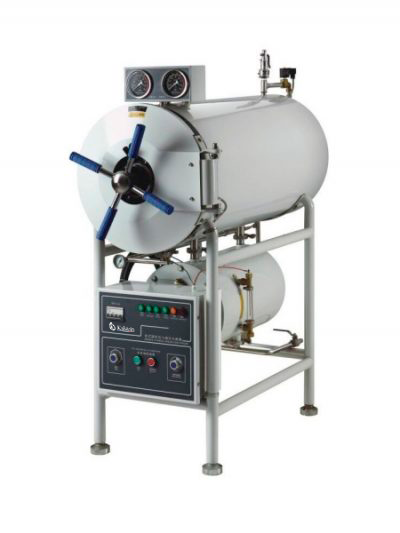An autoclave is a piece of equipment used to sterilize medical or laboratory material, using steam under pressure and temperature as sterilizing agents. This makes it possible to eliminate any trace of viruses, bacteria, fungi and spores in the materials, liquids or solids that are placed inside.
Types of autoclaves according to their shape
- Vertical autoclaves: they are specially designed for the sterilization of liquids and food in laboratories, pharmaceutical and food factories. These autoclaves make the process easier, safer, more accurate, reproducible, and easier to validate. The compact, space-saving design makes them ideal for small labs where space is tight and the increased chamber height (up to 50% more capacity) means they can handle most standard media bottles. .
- Horizontal autoclaves: they are ideal for hospitals and laboratories, where high volume sterilization is required, such as academic facilities, hospitals, pharmaceutical industries, biotechnology industries and research centers. These units efficiently meet the stringent sterilization requirements of your needs. It is suitable for all wrapped or unwrapped solid instruments, class A cavity instruments (dental handpieces and endoscopes), implantable instruments, dressing cloth and rubber tubing, among others. These autoclaves require minimal table space, making them an ideal sterilization solution for small clinics.
What should you keep in mind around the autoclave?
Sterilization is defined as the process of destroying all forms of microorganisms, including spores. The autoclave, thanks to its design, allows the sterilization process to be carried out with high pressure and steam, killing any microorganism, including viruses, dangerous bacteria, as well as all their forms of spores. The use of a pressure steam autoclave is one of the best known and most effective sterilization methods.
A tool or material that is sterile, that is, that has undergone a sterilization process, is completely safe for the human body. For sterilization to be effective, the material must be properly prepared, the process itself must be performed correctly, and the tools after sterilization must be properly stored.
The equipment used must first undergo preliminary disinfection, washed under running water or in a washing machine, dried, and then packed in packaging intended for sterilization. Proper sterilization must not damage or change the properties of sterilized instruments.
Autoclaves must be controlled to ensure that the methods used achieve sterilization of the materials. There are chemical and biological control methods. The chemicals are used daily as a routine control, although they are not considered definitive proof.
Controlling an autoclave with a biological indicator is the most widely accepted test method today. It is carried out with spores, commonly the Stearothermophilus bacillus, which can survive up to 13 minutes at a temperature of 121 ° C (250 ° F). These microorganisms are the most resistant to temperature and thus provide an adequate margin of safety when validating sterilization procedures.
Maintenance of an autoclave
An autoclave requires regular maintenance for our safety and for proper equipment functionality. However, if there is a problem with the operation of your autoclave, you should also ensure that you have reliable and quality technical support.
You must understand that autoclaves in addition to requiring regular maintenance and also need parts replacement from time to time in order to continue to function properly and extend their useful life.
At Kalstein we are MANUFACTURERS and we offer you an excellent range of autoclaves at the best PRICES on the market. That is why we invite you to take a look at: HERE

